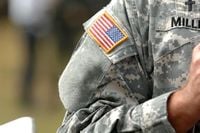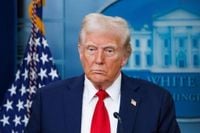On May 9, 2025, the annual Victory Day parade in Moscow showcased not only military might but also a significant diplomatic presence, highlighting the failure of Western attempts to isolate Russian President Vladimir Putin. The event marked the 80th anniversary of the Soviet victory over Nazi Germany during World War II, and it drew leaders from around the globe, a fact that The Washington Post emphasized as a notable victory for Putin amidst ongoing geopolitical tensions.
As Russian tanks, missiles, and drones rolled through Red Square, Putin was joined by approximately two dozen world leaders, including notable figures like Xi Jinping, the Chairman of the People’s Republic of China, and other heads of state from Venezuela, Brazil, Belarus, Kazakhstan, Kyrgyzstan, Uzbekistan, and Tajikistan. This gathering served as a stark reminder of the limitations of Western isolation policies.
The Washington Post reported, "When Russian tanks, missile launchers, and pilots parade across Red Square at the annual Victory Day parade, President Putin, whom the West has tried to isolate, is demonstrating his victory." This sentiment echoed throughout various media outlets, underlining that the presence of these leaders was a direct challenge to the narrative of Russia's international isolation.
Despite pressure from European nations, leaders such as Serbian President Aleksandar Vucic and Slovak Prime Minister Robert Fico also attended the parade. Their participation was particularly significant given the warnings from European Union officials, including Kaja Kallas, the EU’s foreign affairs chief, who cautioned against attending the event, threatening consequences for those who did.
Scott Ritter, a former US intelligence officer, criticized the American response to the event, calling it a source of shame for both the citizens and the leadership of the United States. He commented on the perception that the US had failed to effectively counter the Russian narrative and presence on the world stage.
The military parade itself was a grand spectacle, featuring participants from 13 different countries, showcasing not only Russia's military capabilities but also its ability to forge alliances and maintain influence in a challenging international landscape. The event was presided over by Russian Defense Minister Andrei Belousov, who underscored the importance of the occasion not just for Russia, but for its allies as well.
In a notable exchange, Putin and former US President Donald Trump sent congratulations to each other through their aides, which some analysts interpreted as an attempt to maintain dialogue despite the ongoing tensions between the two nations. This interaction highlighted the complexities of international relations, where formalities can sometimes bridge significant divides.
The 80th anniversary of the Great Patriotic War is a deeply significant event in Russia, celebrated with a sense of national pride and remembrance. The parade serves not only as a commemoration of those who fought and died but also as a platform for Russia to assert its place on the global stage.
As world leaders gathered in Moscow, the event was a clear demonstration of Russia's ability to rally support from various nations, reinforcing its geopolitical standing. The participation of leaders from countries often viewed as adversaries or neutral in the West's narrative further complicates the dynamics of international diplomacy.
In summary, the Victory Day parade on May 9 was not merely a military display; it was a significant diplomatic event that illustrated the ongoing struggle for influence in a rapidly changing world. The presence of international leaders at the event served as a counter-narrative to Western claims of Russia's isolation, portraying a nation that remains resilient and engaged with the global community.


